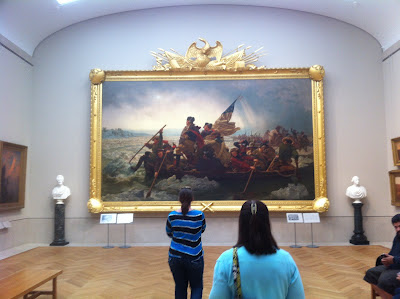
Rev. Fergus Clarke, an Ireland-born Franciscan priest, was pastor at St. Joseph's Catholic Church in Placentia, California, where he became fast friends with Charlie Frazee, my seminary church history professor and a longtime St. Joseph's lector and teacher. Around that time, Fergus felt called to the Franciscans' traditional ministry of caring for Christian sites in Israel and the West Bank. These days he's the ranking Roman Catholic at the Church of the Holy Sepulcher in Jerusalem, where million

s line up every year to kneel in the tiny chapel built several meters above what remains of Jesus's tomb. Thanks to Charlie's good offices, when St. John's folk are in the Holy Land they get Fr. Fergus's generous behind-the-scenes tour of the world's holiest church.
Last Friday, as we stood in the friars' spare kitchen and dining room at the beginning of an astonishing two hours, Fergus pointed at a doorway behind a refrigerator. "I'm bringing you here not because our refectory and kitchen are much to look at but because they are built in the same area where, in the middle of the fourth century, Helena had her quarters," he said. Queen Helena was

Constantine the Great's mother. She came to Jerusalem, found what was thought to be Jesus Christ's cross, and resolved to build one of her three churches over Golgotha and Christ's tomb (which most authorities now agree were indeed within sight of each other). "That door was once the window through which Helena would look down on Cyril of Jerusalem as he gave his sermons," Fergus said. Cyril was a great bishop, catechist, and defender of Christian orthodoxy -- heady company when you're having your morning oatmeal.
Fergus's equally riveting accounts of the politics, diplomacy, and intrigue that ensue when Catholics, Copts, Ethiopians, and Greek, Armenian, and Syriac Orthodox make decisions about everything from plumbing to liturgy -- alas, all off the record. I'll risk this much: He said that Catholics have to keep chanting and celebrating in Latin during their beautiful services in the Holy Sepulcher since, if they switch to the vernacular, the other denominations might well claim that the friars no longer represent t

he Latin church referred to in 19th century and subsequent agreements and try to revoke the Catholics' rights and privileges. Among these is that Fergus and his colleagues (the only clerics who live in the Holy Sepulcher) are locked in every night by the church's Muslim doorkeeper. If that sounds weird, welcome to Jerusalem and a church that brims with mystery, ritual, and periodic controversy.
Fergus insists that the latter's been overblown and overstressed by the media. He says that every family living in close quarters has its bad days and stresses all the things that go smoothly in spite of the six denominations' vast doctrinal differences and centuries of hurt feelings. For instance, Raymond Cohen's
Saving the Holy Sepulcher: How Rival Christians Came Together to Rescue Their Holiest Shrine details a half-century-long cooperative effort to restore and rehabilitate the church that kept it from crumbling to dust. What made that work possible, Fergus told us, is the denominations' shared belief in an indispensable first principle. "Bill Clinton was famous for saying 'It's the economy, stupid' in one of his campaigns," Fergus said. "For all of us here, it's the Resurrection, stupid."
Fergus's vocation and infectious passion are themselves signs of Easter power. He's a charming, hospitable, fun-loving man who's willing to get up at two in the morning for the first service of his day, negotiate endlessly with Copts over restroom rights, and submit to being padlocked nightly inside his place of business only because he believes with all his heart in the scandalous reality that Jesus Christ spurned his tomb, walked fully alive into the Jerusalem sunshine, and in doing so destroyed the power of death, sickness, injustice, oppression, and everything else that fiendishly masks the abundant potentiality of our God-drenched lives.
Clinton was Fergus's second presidential reference, by the way. The first was to none other than Richard Nixon. He recalled his visit to Nixon's Yorba Linda gravesite in the 1990s and also 37's comment in July 1969 that two Apollo 11 astronauts' moon walk was the greatest event in the history of humankind. Our host begged to differ, since that event

would, of course, have been the Resurrection. I reminded him that pilgrim Kathy (shown here stooping to touch Golgotha) and I had both worked for 37. He actually said the Apollo mission had occurred during "the greatest week in the history of the world since the Creation." That's an even more reckless statement, unless you submit to the logic of Nixon's comparison. When the comment became controversial at the time, he said that he'd been naturally drawn to the seven-day (actually six) Creation since Apollo 11 also lasted about a week (actually eight days).
There's also the matter of the Yorba Linda Quaker's lifelong skepticism about the bodily Resurrection of Christ -- about which, I'm sure, Fergus will bring him around in good time, if circumstances and conditions have not done so already.
 Last Friday afternoon at the Church of the Holy Sepulcher, from left to right: St. John's pilgrims Ed, Kathy, Christian, Shannon, Debbie, Remy, Alexandra, Fr. Michael, and Brenna; Fr. Fergus; pilgrims Allana, Steven, Pastor Lisa, Kathe, Cathy, Jerry, and Bob. Missing: Pilgrims Cindy D., Cindy K., Damian, and John (the photographer)
Last Friday afternoon at the Church of the Holy Sepulcher, from left to right: St. John's pilgrims Ed, Kathy, Christian, Shannon, Debbie, Remy, Alexandra, Fr. Michael, and Brenna; Fr. Fergus; pilgrims Allana, Steven, Pastor Lisa, Kathe, Cathy, Jerry, and Bob. Missing: Pilgrims Cindy D., Cindy K., Damian, and John (the photographer)
This version of my post, updated on July 4, includes two corrections graciously provided by Fr. Fergus.
 Episcopal as in pertaining or relating to bishops and the historic episcopacy, that is.
Episcopal as in pertaining or relating to bishops and the historic episcopacy, that is.












































